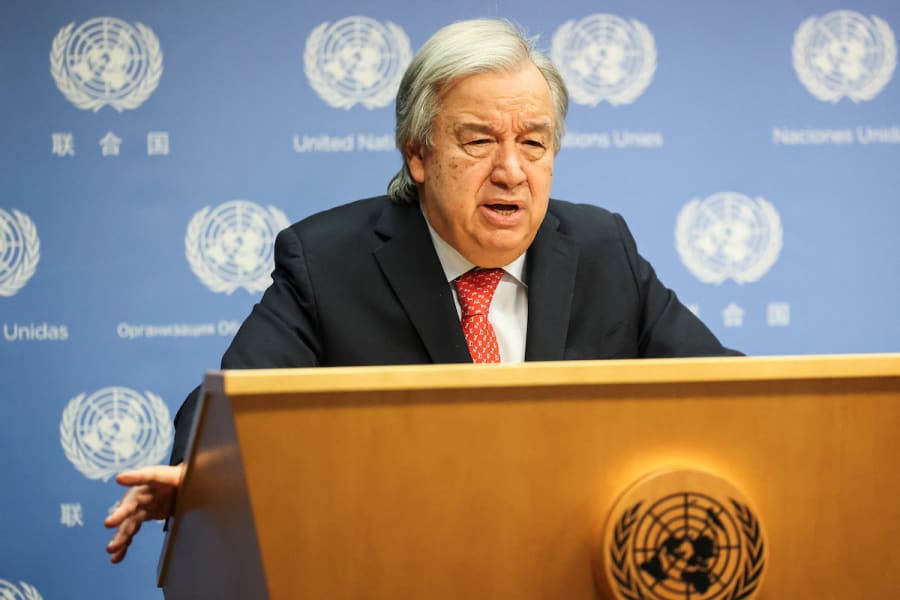UN head Guterres blasts Netanyahu for rejecting two-state solution amid Israel-Hamas war in Gaza

UN Secretary-General António Guterres blasted the Israeli government’s rejection of a two-state solution during the Non-Aligned Movement Forum in the Ugandan capital Kampala on Saturday.
The Non-Aligned Movement (NAM) is political bloc consisting of 120 countries in Africa, Asia and South America, including regimes that are hostile to Israel such as Iran, Syria, Libya, South Africa and Iraq.
“The refusal to accept a two-state solution for Israelis and Palestinians, and the denial of the right to statehood for the Palestinian people, are unacceptable,” Guterres stated. “The right of the Palestinian people to build their own state must be recognized by all.”
The UN head claimed that a rejection of the two-state solution “would indefinitely prolong a conflict that has become a major threat to global peace and security; exacerbate polarization; and embolden extremists everywhere.”
On Monday, Guterres called for an immediate humanitarian ceasefire in Gaza.
The Non-Aligned Movement made a statement where it “strongly condemned the illegal Israeli military aggression against the Gaza Strip” and completely ignored that the Hamas terror organization initiated the war when terrorists invaded Israel and massacred more than 1,200 Israelis, mostly civilians and abducted at least 240 hostages into Gaza.
The nations that were assembled in Uganda also called for “the independence and sovereignty of the State of Palestine, with East Jerusalem as its capital, in order to achieve a two-state solution,” without acknowledging that both Hamas and the Palestinian Authority (PA) reject Israel’s right to exist as an independent Jewish state.
Israeli Prime Minister Benjamin Netanyahu recently warned that giving the PA control of its own state would continue to threaten Israel’s national security.
"All territory we evacuate, we get terror, terrible terror against us,” Netanyahu warned, referring to the anti-Israel terror groups that have emerged in southern Lebanon, Gaza and parts of the West Bank following Israel's withdrawal in the past. Netanyahu previously argued that the PA should have all the powers to govern itself but none of the powers to threaten the Jewish state.
While many Israelis accept a two-state solution in theory, they fear that such Arab state would be hostile and threaten Israel, as has been the case with Hamas leadership in Gaza and the PA government's incitement against Jews.
However, the Netanyahu-led government’s position is at odds with the U.S. Biden administration’s official goal to eventually establish the two-state solution, with Israelis and Palestinians living side by side.
The two-state solution has been discussed in many different forms over the last hundred years.
In 1937, the British Peel Commission called for the establishment of an Arab and a Jewish state. The Jewish side reluctantly accepted it while the Arab side rejected the British proposal outright.
In November 1947, the United Nations passed a resolution calling for a division of the remaining British-administered Palestine Mandate west of the Jordan River into one Jewish and one Arab state. Jerusalem was earmarked to become an international zone.
The British had already created the Hashemite Kingdom of Jordan on approximately 80% of the original British Palestine Mandate located east of the Jordan River.
David Ben-Gurion accepted the international two-state proposal on Israel's behalf, even though the Jewish majority in Jerusalem would be excluded from the emerging Jewish state. By contrast, the Arab side vehemently rejected the two-state solution.
Following Israel’s victory in the War of Independence in 1948, Egypt and the Hashemite Kingdom of Jordan occupied the Gaza Strip and Judea and Samaria, internationally known as the West Bank, and refused to establish another Arab state in these territories.
In 1964, three years before Israel gained control of the West Bank and Gaza in the Six-Day War of 1967 the Palestine Liberation Organization (PLO) was established with the explicit goal of “liberating occupied Palestine.”
But the PLO was not referring to Gaza, which was controlled by Egypt, or the Jordanian-held West Bank. Instead, the PLO sought to gain control of the Jewish state, within internationally recognized borders that included Jerusalem and Tel Aviv.
In 2000 and 2007, the PA once again rejected American-brokered attempts to implement a peaceful two-state solution due to its ideological opposition against the existence of a Jewish state.

The All Israel News Staff is a team of journalists in Israel.












